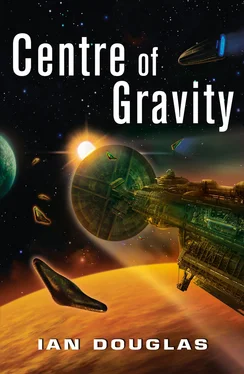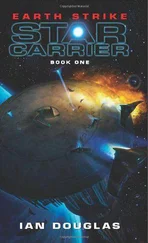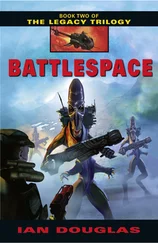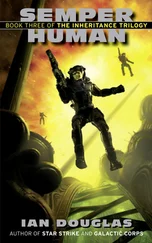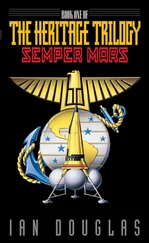“Not entirely, sir,” another of Carruthers’ aides said. His id identified him as Commander Jesus Vasquez. “There are people out there today who don’t rely on computer technology.”
“Squatties,” Gregory said, making a face. “Prims.”
“Exactly. In any case, the Sh’daar seem to just want us to stop further technological development.”
“This far and no further, eh?” Carruthers said.
Koenig shook his head. “And I would argue, Commander, that that means giving up an essential part of our humanity as well. We’re always going to be tinkering. We find a way to make a hotter fire … and that in turn leads to discovering copper and tin when they ooze out of the rocks around the campfire. We play with those, find we can mix them, and we discover bronze. Meanwhile, someone builds an even hotter fire and learns how to smelt iron. Technological innovation started with knocking chips off the edge of a piece of flint, and it hasn’t stopped since.”
“But progress can’t keep going on forever, can it?” Gregory asked. “There has to be a point where there’s nothing more to be discovered. No more inventions, no more improvements to be made.”
“Can’t it? I wonder. Have you ever heard of the technological singularity?”
“No, sir. What’s that?”
“Old idea, late twentieth century. Back then, science and technology were improving at a steadily increasing rate, at an exponentially increasing rate.” Koenig moved his hand as though following a line on a graph, going up gradually, then more steeply, then straight up. “At some point, it was theorized, technological advancement would be accelerating so quickly that life, that humanity itself, would become completely unrecognizable within a very short span of time. It was called the technological singularity … or sometimes the Vinge Singularity.”
Carruthers got the faintly glassy, distant look of someone pulling data down from the local Net. “Ah,” he said. “Vernor Vinge, right?”
“That’s the guy. Of course, we haven’t hit the singularity yet … at least not to that extent. Someone from five hundred years ago would still be able to relate to the world we know today. Nanassemblers might seem like magic, sure, but with a little training and some minor surgery to give them the necessary implants, they’d get along in our society just fine. Life hasn’t changed fundamentally, not to the extent some theorists envisioned.”
“I’m beginning to think some sort of new super-weapon is going to be our only hope,” Carruthers said. “But we’re going to need to develop it damned fast, because if the Sh’daar Empire doesn’t take us down pretty soon, I’m beginning to think the politicians will.”
“So what is the current status of Crown Arrow?” Koenig asked with blunt directness.
“On hold in committee in the Military Directorate,” Carruthers told him. “The vote has been delayed again, indefinitely, this time. I was told two days ago that we don’t want to provoke the Sh’daar into hasty action.”
“What, they don’t want us to make them mad?” Koenig asked. He laughed. “I’d say they’ve been royally pissed at us for thirty-seven years!”
“Maybe. And maybe an empire of some billions of worlds is so big they move slowly.”
“And maybe we need to buy ourselves time, which is what Crown Arrow was supposed to do in the first place!”
Operation Crown Arrow was a strategic concept originally presented by Koenig to the Senate Military Directorate ten months earlier, shortly after the previous year’s twin defeats at Arcturus Station and Everdawn. The ONI had tentatively identified a major Turusch staging base at Alphekka, a star that, from Earth, was the brightest star in the constellation Corona Borealis, the “Northern Crown.” Koenig’s plan called for a large-scale carrier strike against the enemy base there, seventy-two light years from Earth. By taking the war deep into enemy-held space, the Sh’daar’s timetable might be thrown off, and forces now being gathered for an assault against Sol and its inner colonies might be drawn off.
The Joint Chiefs of Staff had given the oplan their unqualified support, but for the past ten months, the Military Directorate had dithered, passing it through various committees and subcommittees, requesting clarifications and revisions, running it through virtual simulations to determine likely military, political, and economic outcomes, and always failing to bring it to a final vote.
Carruthers palmed a contact on the table next to them, and the assembler inside produced another drink, which seemed to rise up out of the table as though extruded from the hard black surface itself. He picked up the glass, studied it for a moment, and then downed it in a single gulp.
“I hear you, Admiral,” Carruthers said after a moment. “Believe me, we all do. We have allies in the Senate who are doing their best, but …” He shrugged and set the glass back on the table. After a moment, it seemed to dissolve back into the tabletop from which it had been nanufactured. “We’re going to have to be patient,” he said, finally.
“Just so long as the Sh’daar and their allies are patient as well,” Koenig said. “I do know one thing, though.”
“What’s that?”
“We humans are a technic species. Our technology, the pace of our technological advance, is a part of us, a part of everything we do. If we surrender our ability to make our own technological decisions to the Sh’daar …”
“We can’t do that, damn it,” Buchanan put in.
“No,” Koenig agreed. “For us, that would be racial suicide. Extinction . …”
“Slow extinction if we surrender to the Sh’daar Empire,” Carruthers said, “and quick extinction if we keep fighting them, and lose. It seems our species has damned few alternatives open to it.”
“ Very few,” Koenig said.
Outside the light and noise of the eudaimonium, the night seemed very dark indeed.
21 December 2404
High Guard Destroyer Qianfang Fangyu
Entering Earth Space, Sol System
1440 hours, TFT
The intruder had left the High Guard destroyer trailing far behind. Qianfang Fangyu ’s top acceleration was five hundred gravities, and after seventy-five minutes, the vessel was traveling sunward at 22,500 kilometers per second, and had covered about one third of an astronomical unit, less than 4 percent of the current distance between Saturn and Earth. The intruder—the H’rulka ship, if that’s what it was—had rapidly begun accelerating at an estimated ten thousand gravities, swiftly outdistancing the High Guard ship, which was lagging farther and farther behind. By now, if the H’rulka vessel had held to that incredible acceleration, it would be traveling at just under the speed of light, and would have already covered nearly six AUs.
It would now be within thirty minutes of Earth.
The Qianfang Fangyu had had continued broadcasting warnings at radio and at optical wavelengths throughout the past seventy-five minutes, however.
The messages should be arriving in Earth-space any moment now. …
Palisades Eudaimonium
New York State, Earth
1941 hours, EST
“Trevor, you can’t just run away from me. We need to talk !”
He’d found a private alcove halfway up the stepped interior of the bowl. She’d found him, though, trailing the id broadcast by his implant.
He looked up. “About what?”
“About us? About what happened. …”
“I don’t see where talking is going to change anything. Unless you want to come back with me?”
Читать дальше
